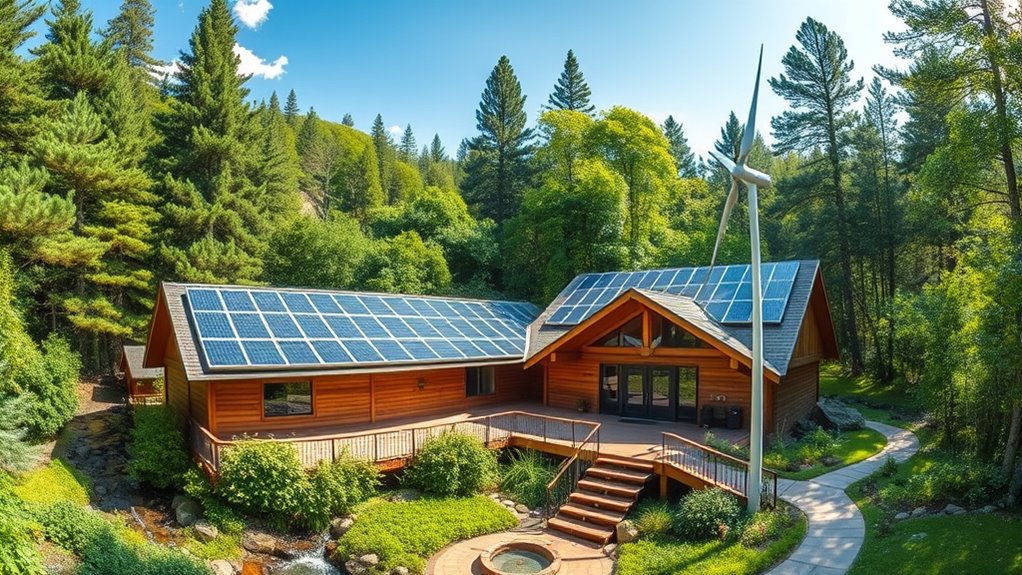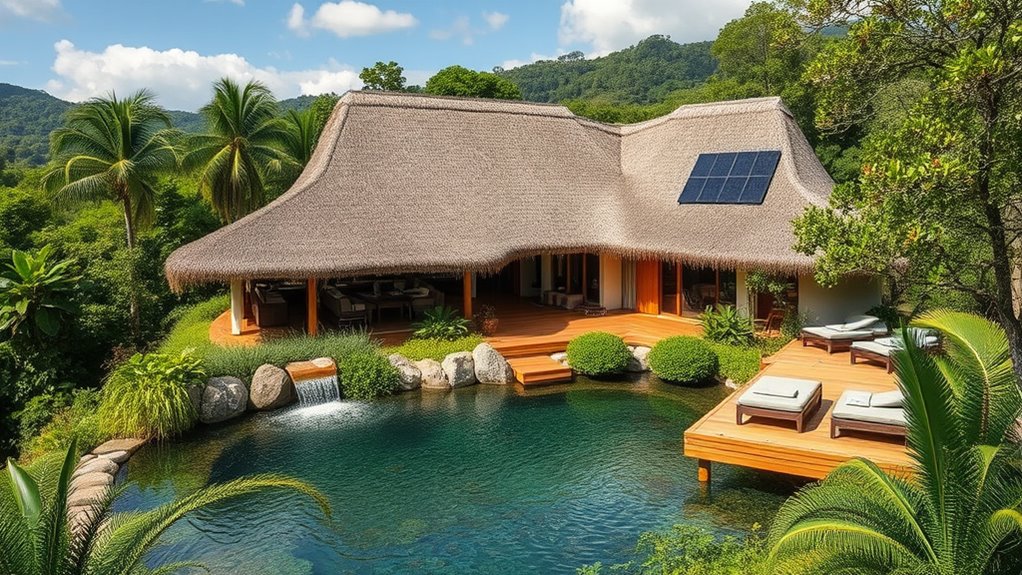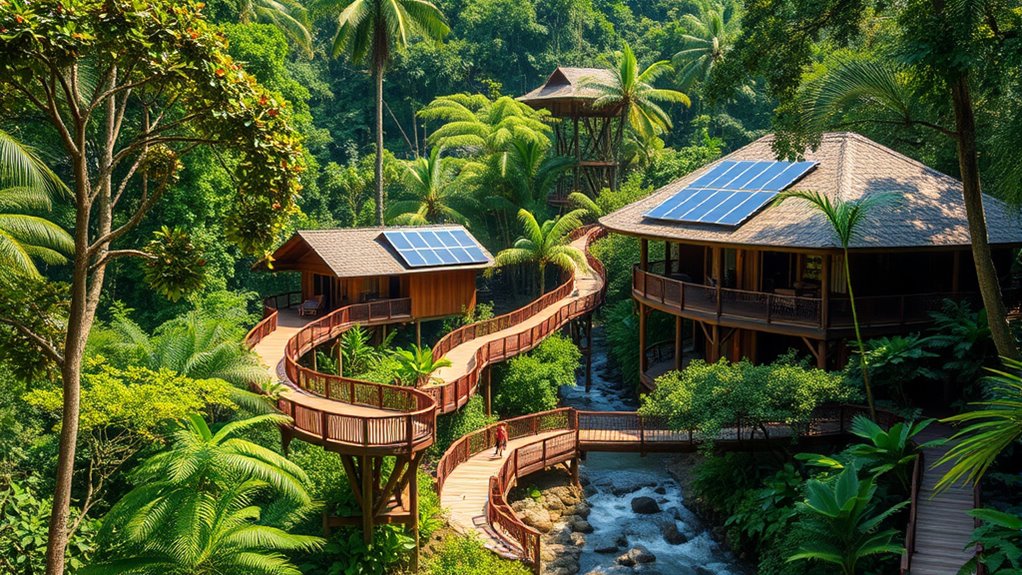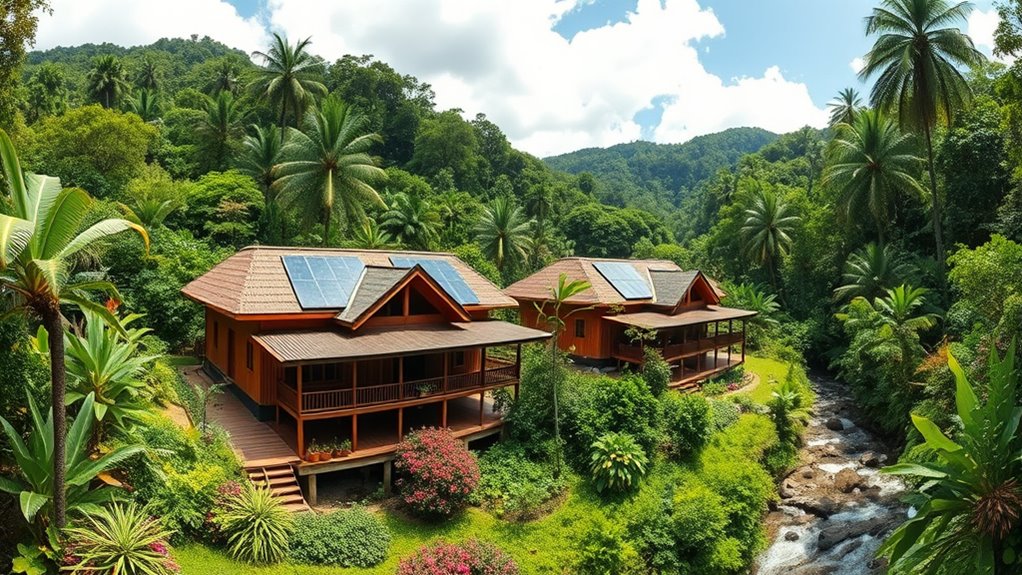Eco-lodges are truly sustainable when they use eco-friendly building materials, harness renewable energy like solar power, and implement water-saving strategies such as rainwater harvesting. They also focus on waste reduction through recycling and composting while supporting local communities and preserving natural habitats. Promoting eco-conscious practices among guests and obtaining transparent certifications further showcase their commitment. If you want to discover how these elements come together to create eco-friendly stays, keep exploring this inspiring approach.
Key Takeaways
- Use of eco-friendly building materials, passive design, and renewable energy sources like solar and wind to minimize environmental impact.
- Implementation of water conservation strategies such as rainwater harvesting, water-efficient fixtures, and greywater recycling.
- Sourcing supplies locally, supporting community projects, and preserving local culture and traditions.
- Promoting eco-conscious practices among guests and maintaining natural habitats through biodiversity-friendly initiatives.
- Achieving third-party sustainability certifications and maintaining transparency to demonstrate genuine environmental commitment.
Use of Eco-Friendly Building Materials and Design

When designing eco-lodges, choosing eco-friendly building materials and sustainable design features is essential. You want materials that minimize environmental impact, such as reclaimed wood, bamboo, or recycled metal, which reduce waste and conserve resources. These eco friendly building materials not only lower your carbon footprint but also guarantee durability and aesthetic appeal. Incorporating sustainable design features like passive solar heating, natural ventilation, and green roofs to enhance energy efficiency and reduce reliance on non-renewable resources. Additionally, selecting materials with low embodied energy further minimizes environmental impact, ensuring the lodge aligns with eco-conscious principles. By selecting these materials and features, you create a lodge that aligns with eco-conscious principles, preserving the environment while offering guests an authentic, sustainable experience. Your thoughtful choices in materials and design set the foundation for a truly eco-friendly lodge that benefits both nature and your visitors.
Implementation of Renewable Energy Sources

Implementing renewable energy sources is key to making eco-lodges sustainable. You can maximize the benefits by integrating solar power efficiently into your design. When done right, solar energy becomes a reliable, eco-friendly power source that reduces your lodge’s carbon footprint. Additionally, understanding solar energy fluctuations can help optimize system performance throughout different seasons and weather conditions.
Renewable Energy Integration
Have you ever wondered how eco-lodges seamlessly incorporate renewable energy sources into their operations? They often use solar panels to harness sunlight and generate electricity, providing a clean, sustainable power supply. Wind turbines are another common solution, capturing wind energy to supplement or replace traditional power sources. These installations are strategically placed to maximize efficiency without disrupting the natural environment. By integrating solar panels and wind turbines, eco-lodges reduce their reliance on fossil fuels, lowering carbon emissions. The energy produced can power lighting, heating, and other essential services, ensuring guests enjoy comfort while minimizing environmental impact. This combination of renewable sources demonstrates a commitment to sustainability and helps eco-lodges operate more independently from external energy grids. Additionally, implementing energy storage systems allows for a consistent power supply even when the sun isn’t shining or the wind isn’t blowing.
Efficiency of Solar Power
Ever wonder how eco-lodges maximize the efficiency of their solar power systems? You can boost solar efficiency by installing high-quality panels that capture maximum sunlight throughout the day. Proper orientation and regular cleaning help ensure these panels operate at peak performance. Additionally, integrating advanced energy storage solutions allows you to store excess energy generated during sunny periods for use during cloudy days or at night, reducing reliance on grid power. Efficient energy storage not only stabilizes your power supply but also enhances overall system performance. Incorporating solar-powered ventilation can further improve indoor comfort while maintaining energy efficiency. By focusing on solar efficiency and effective storage, you ensure your eco-lodge remains sustainable, minimizes energy waste, and operates smoothly regardless of weather conditions. This synergy of technology and design makes your eco-lodge genuinely eco-friendly and self-sufficient.
Water Conservation and Management Strategies

How can eco-lodges effectively reduce water usage without compromising guest comfort? The answer lies in smart strategies like rainwater harvesting and installing water-efficient fixtures. Rainwater harvesting captures rainfall, supplementing water supply needs sustainably. Water-efficient fixtures, such as low-flow showerheads and dual-flush toilets, minimize water waste while maintaining comfort. Visualize this:
| Rainwater Collection | Water-Saving Devices | Guest Comfort |
|---|---|---|
| Captures rainwater | Low-flow fixtures | Still feels luxurious |
| Stored in tanks | Reduce consumption | No impact on experience |
| Used for landscaping | Eco-friendly solutions | Guests stay comfortable |
| Minimizes grid reliance | Cost-effective | Sustainability seamless |
Additionally, integrating water management strategies like greywater recycling can further enhance conservation efforts without affecting guest satisfaction.
Waste Reduction, Recycling, and Composting Initiatives

Building on eco-lodges’ commitment to sustainable water management, focusing on waste reduction, recycling, and composting further minimizes environmental impact. Implementing zero waste strategies encourages you to reduce, reuse, and recycle materials, cutting down landfill contributions. Shifting to eco-friendly packaging, such as biodegradable or reusable containers, helps prevent plastic waste. Composting organic waste transforms food scraps and yard waste into nutrient-rich soil, reducing waste and supporting local ecosystems. Incorporating raw food principles into lodge practices can also promote more sustainable food consumption and waste management. These initiatives demonstrate your lodge’s dedication to minimizing ecological footprints and promoting responsible tourism. By adopting holistic waste management practices, you not only protect natural resources but also set a positive example for guests, inspiring them to adopt similar eco-conscious behaviors beyond their stay.
Supporting Local Communities and Economies

Supporting local communities and economies is essential for sustainable eco-lodges. You can boost this by creating jobs, sourcing supplies locally, and backing community projects. These efforts strengthen both the environment and the livelihoods of those nearby. Implementing necessary cookies ensures the site functions properly while respecting user preferences.
Promoting Local Employment Opportunities
Promoting local employment opportunities is essential for ensuring that eco-lodges benefit the communities they operate in. By prioritizing local hiring, you support community development and create economic stability. Employing residents reduces reliance on external labor and keeps revenue within the community. This approach fosters strong relationships with local workers and encourages skill development, which can lead to long-term growth. When you prioritize local employment, you empower community members to take ownership of sustainable tourism efforts. It also enhances the lodge’s reputation as a responsible and community-centered establishment. Additionally, offering aquatic exercise programs to staff and guests can promote health and well-being within the community. Ultimately, providing local employment opportunities ensures that eco-lodges contribute meaningfully to the well-being and resilience of the surrounding community, reinforcing the core sustainability principles they stand for.
Sourcing Regional Supplies Sustainably
Focusing on sourcing regional supplies sustainably strengthens the connection between eco-lodges and their communities. By prioritizing local sourcing, you support regional procurement that benefits local farmers, artisans, and producers. This approach reduces transportation emissions and minimizes environmental impact, aligning with your lodge’s sustainability goals. When you source regionally, you promote fresh, high-quality ingredients and authentic local crafts, enriching your guests’ experience. It also helps sustain local economies, creating jobs and encouraging community growth. By actively choosing regional supplies, you demonstrate your commitment to environmental responsibility and social support. This strategy fosters trust and loyalty among guests who value eco-conscious practices. Incorporating necessary cookies and other relevant policies ensures transparency and fosters trust with your visitors. Overall, regional procurement is a crucial step toward making your eco-lodge truly sustainable and integrated into its local environment.
Supporting Community Projects
Engaging in community projects allows eco-lodges to directly contribute to the well-being and development of their local areas. By supporting community development and cultural preservation, you help guarantee long-term sustainability. Your efforts can include partnering with local artisans, funding educational programs, or organizing cultural festivals that celebrate heritage. These initiatives foster economic growth and strengthen community ties. Additionally, promoting local crafts and traditions helps preserve cultural identity amid tourism. You can also empower residents through skill-building workshops or supporting local agriculture. This active involvement not only benefits the community but also enriches your guests’ experience. Incorporating Textile Line techniques into crafts and decor can further showcase local craftsmanship and promote sustainable practices. Ultimately, supporting community projects creates a positive cycle of shared growth, ensuring that eco-lodges remain responsible stewards of the environment and culture.
Promoting Eco-Conscious Practices Among Guests

Encouraging guests to adopt eco-friendly habits is essential for maximizing the environmental benefits of your eco-lodge. You can achieve this through guest eco education, providing clear information about sustainable practices and their impact. Use signage, welcome kits, and conversations to highlight simple actions like conserving water, recycling, and minimizing energy use. Additionally, organize environmental awareness campaigns that engage guests, such as eco-friendly workshops or nature walks focused on conservation. When guests understand how their actions contribute to sustainability, they’re more likely to participate actively. By fostering a culture of eco-consciousness, you not only reduce environmental impact but also enhance their overall experience, making sustainability a shared goal during their stay.
Preservation of Natural Habitats and Biodiversity

Maintaining the natural habitats surrounding your eco-lodge plays a vital role in supporting local biodiversity. By creating wildlife corridors, you guarantee animals can move safely between habitats, reducing fragmentation. Engaging in habitat restoration helps repair damaged ecosystems, encouraging plant and animal diversity. Protecting existing natural areas prevents unnecessary development that can threaten wildlife. Additionally, involving guests in conservation efforts fosters awareness and shared responsibility.
Preserving natural habitats supports biodiversity and involves creating wildlife corridors, restoring ecosystems, and engaging guests in conservation efforts.
- Design pathways that connect forest patches to promote animal movement
- Use native plants during habitat restoration projects
- Minimize land clearing to preserve existing ecosystems
- Educate guests on the importance of habitat preservation for biodiversity
Transparent Sustainability Policies and Certifications

Transparent sustainability policies and certifications are essential for building trust with guests and demonstrating your eco-lodge’s genuine commitment to environmental responsibility. By obtaining third-party certifications, you prove your adherence to recognized eco-standards, giving guests confidence in your practices. Clear, transparent reporting of your sustainability efforts shows honesty and accountability, highlighting your progress and areas for improvement. These certifications, such as Green Globe or LEED, serve as credible proof of your eco-lodge’s commitment to sustainability. Communicating your policies openly reassures guests that your operations prioritize environmental health and social responsibility. Ultimately, transparency in your sustainability efforts distinguishes your eco-lodge and fosters loyalty among eco-conscious travelers seeking authentic, eco-friendly stays.
Frequently Asked Questions
How Do Eco-Lodges Measure Their Overall Sustainability Impact?
You can assess an eco-lodge’s sustainability impact by examining its use of renewable energy sources and waste management practices. They often track energy consumption, renewable energy adoption, and waste reduction efforts. You might also look at water conservation, local community engagement, and eco-certifications. By monitoring these factors, you get a clear picture of how well the eco-lodge minimizes its environmental footprint and promotes long-term sustainability.
What Challenges Do Eco-Lodges Face in Maintaining Sustainability Standards?
Did you know that over 60% of eco-lodges struggle to maintain strict sustainability standards? You face challenges like balancing resource management with guest comfort and supporting the local community. It’s tough to reduce environmental impacts while providing quality experiences. You must constantly innovate and educate staff and visitors, ensuring sustainable practices stay a priority. These efforts are essential to preserve the environment and uplift local communities, despite ongoing hurdles.
How Do Eco-Lodges Balance Luxury Amenities With Environmental Responsibility?
You balance luxury amenities with environmental responsibility by choosing eco-friendly options that enhance guest experience without harming nature. Incorporate sustainable materials, energy-efficient appliances, and water-saving fixtures to provide comfort. You can also offer unique, nature-inspired experiences that emphasize your eco-lodge’s commitment to sustainability. This way, guests enjoy luxury while you maintain your eco principles, creating a memorable stay that respects the environment.
Are There Financial Incentives for Eco-Lodges to Adopt Sustainable Practices?
You might wonder if eco-lodges get financial perks for sustainable practices. Yes, they often benefit from tax incentives and government grants that encourage eco-friendly initiatives. These incentives help offset costs of green upgrades, renewable energy systems, and eco-certifications. By taking advantage of such programs, eco-lodges can reduce expenses and promote sustainability, making it financially attractive to prioritize eco-conscious operations while providing guests with a greener experience.
How Do Eco-Lodges Engage Guests in Their Sustainability Efforts?
You can engage guests in sustainability efforts through interactive guest participation and educational programs. Encourage them to join activities like conservation projects or recycling initiatives, making them active contributors. Offer workshops or informational sessions to raise awareness about eco-friendly practices. By involving guests and providing educational programs, you create a memorable experience that fosters a deeper understanding of sustainability, inspiring them to adopt eco-conscious habits beyond their stay.
Conclusion
By embracing eco-lodges, you’re not just staying somewhere comfortable—you’re making a real difference. Their sustainable practices safeguard the environment, support local communities, and promote responsible tourism. Remember, the proof is in the pudding, so choose lodges that walk the talk with transparent policies and certifications. When you travel sustainably, you help ensure our planet’s beauty endures for generations to come. It’s a win-win situation you won’t regret.









